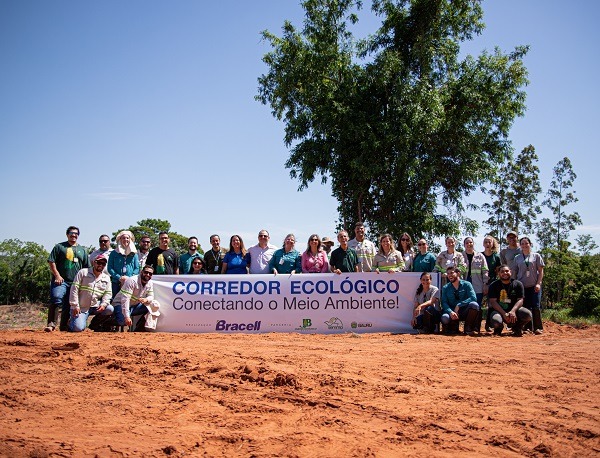Usually associated with paper making, use in civil construction and charcoal production, eucalyptus has attributes that stand out among the trees most present in the daily lives of people around the world. One of the highlights is the use of eucalyptus for the manufacture of dissolving pulp for food, fashion, cosmetics, medicines, paints, sponges and many other industries.
The various sustainable applications and their importance for the economy of Bahia and the country were discussed during the IV Eucalyptus Brazilian Congress, held on August 7 and 8, in Salvador.
With over 30 years of industry experience, Alberto Lima, Bracell’s Technical Services Manager, was one of the event’s guests and addressed the process of soluble cellulose production, highlighting Bracell’s major investments in innovation, research and material development, suitable for the development of high quality products.
“Dissolving pulp differs from paper pulp mainly for its high purity,” explained Alberto. Paper pulp has a purity of around 92%, while dissolving pulp goes through additional processes to attain a purity of around 98.5%
“Thanks to these characteristics, dissolving pulp can be employed, for example, in the manufacture of drug capsules, tablets, surgical supplies, frozen foods, sauces and yogurts,” he said. “We have even evaluated up to 1,500 genetic materials per year to choose sometimes a single material that will be used in the factory.”
Bracell will be the world leader in the production of dissolving pulp and started operations in Brazil in 2003 with the acquisition of BSC (Bahia Specialty Cellulose) and Copener Florestal, renamed Bracell in April this year. The organization has an annual capacity to produce 500,000 tons of dissolving pulp from sustainably-grown eucalyptus wood from plantations in more than 30 municipalities of the North Coast, Agreste and Bahian Recôncavo.
Sustainable development
The congress brought together researchers, planted forest professionals, industry and political leaders, entrepreneurs and forestry engineering students to discuss solutions to obstacles to the development of the planted forest sector, and to present technological advances and business opportunities.
Held by Abaf (Bahia Association of Forest-based Enterprises) and Cedagro (Agribusiness Development Center), the meeting also marked the launch of Bahia Florestal 2019, a report that provides a complete overview of the forest-based production chain in the state and with references to Brazil. The report was presented by Wilson Andrade, CEO of Abaf.
In Bahia, the sector was responsible for collecting R$4.12 billion in taxes in 2018 and for 18.4% of the state’s total exports, generating more than 234,000 direct and indirect jobs in the state.
Lucas Teixeira da Costa, Secretary of Agriculture of the State of Bahia (Seagri), said that “the forestry sector has enormous potential in the state, stressing that it must be a mission for companies and the government to seek sustainability of activities.” In his opinion, “We will spread technology and produce even more eucalyptus in Bahia”.
For Ricardo Alban, president of Fieb, the forest sector can be a benchmark for the idea that “economic development must contribute to environmental preservation”. Firms in the sector preserve an average of 0.7 hectares of native forest per hectare of planted forest – well above the 20% required by law.
Paulo Hartung, president of Ibá (Brazilian Tree Industry), emphasized the competitiveness of the sector in Brazil and the commitment of national companies to leave a better world for future generations, thanks to investments and technologies in sustainable production processes. “We plant trees, retain carbon and have the largest investments in the recovery and preservation of native forests in the country,” he said.
The President of the National Forestry and Agroforestry Commission of the CNA (Confederation of Agriculture and Livestock), Walter Rezende, praised the initiative to discuss forest activity in order to find new solutions to increase productivity and bring even more social, economic and environmental benefits to the country: “We don’t have to plant dreams; we have to plant projects and reap results.”
Social investments
Other attendees included Mouana Fonseca, manager of Institutional Relations and Social Responsibility, and Meryellen Baldim, Coordinator of Environment and Certifications, who spoke about Bracell’s social investments and environmental protection work in the state of Bahia. Currently, the company’s social programs reach over 50,000 people in Bracell’s area of operation.
According to Mouana, social investments fall into the categories of education, entrepreneurship and dialogue. Through them, Bracell works with public managers, educators and students, small farmers, artisans and micro entrepreneurs, providing qualifications and enabling technical and commercial partnerships, as well as promoting citizenship and quality of life.
Meryellen, in turn, presented results of the fauna and flora monitoring program in the company’s areas. Thanks to this work, it has been possible to identify rare, endangered animals and plants and even new species for science, which reaffirms the high degree of conservation of the areas and their importance for scientific knowledge.
Expansion
According to Alberto Lima, the dissolving pulp market follows a strong expansion trend. “It is estimated that the world’s population will reach 9.5 billion people by 2050. This will increase demand for food, restricting cotton growing areas and increasing the demand for eucalyptus for dissolving pulp production.” Because it is biodegradable, cellulose – used in the manufacture of viscose – has an advantage over other fabrics from fossil fuels, such as polyester, which are non-renewable.
In October 2018, Bracell acquired a unit in São Paulo to manufacture paper pulp, and is currently working on a major expansion project to expand its current capacity from 250,000 tons annually to 1.5 million tons. This new unit will be flexible and can produce paper pulp and dissolving pulp. It is the largest and most modern pulp facility in the world and the largest private investment in the state of São Paulo in the last 20 years.



